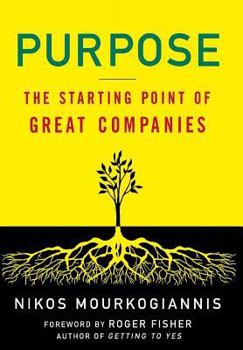Purpose
Select Format
Select Condition 
Book Overview
In Purpose , world-renowned thought leader Nikos Mourkogiannis turns the entire idea of leadership on its head and shows that the choice between values and success is no choice at all. Mourkogiannis argues that companies must satisfy the need for purpose--a set of values that defines an organization and inspires and motivates its employees. Rather than organization and structure, ideas are what cause companies to go from good to great. Drawing on...
Format:Hardcover
Language:English
ISBN:1403975817
ISBN13:9781403975812
Release Date:October 2006
Publisher:St. Martins Press-3PL
Length:272 Pages
Weight:1.22 lbs.
Dimensions:0.9" x 7.0" x 9.6"
Customer Reviews
3 ratings
Purposes and Work Dimensions
Published by Thriftbooks.com User , 17 years ago
Nikos has identified four key components of the moral context in which work can be pursued in an ethically-conscious corporate culture. He critically raises the bar but could ground his admirable attributes to more concrete activities such as those mentioned in the The Fourth Dimension(Hickman,Bott,Berrett,Angus)1996. Excellance could be linked to the PowerWork(tm)concept. Heroism could be joined to NetWork(tm), and Discovery to ValueWork(tm), while Altruism to the general Metawork idea. In this way each dimension of work is clearly identified with a high-value purpose.
To build a great company - you need an enduring purpose
Published by Thriftbooks.com User , 17 years ago
Purpose. The Starting Point of Great Companies. Nikos Mourkogiannis. 2006. ISBN 139781403975812. How to restore confidence and make money at the same time. A very insightful book on people and companies. well written, clear ,very well researched, with valuable appendices. Lessons learned? Not all companies have a Purpose - but enduringly successful ones do. And the essential question," what are we competing for?"
"Purpose is the game of champions"
Published by Thriftbooks.com User , 18 years ago
Obviously, there is a direct link between motivation and purpose, and, between purpose and behavior. Obviously, motives, purposes, and behavior varied significantly among those centrally involved in events which occurred on September 11, 2001. Some flew planes into buildings to kill as many people and create as much damage as possible; others (passengers aboard United flight 93) sacrificed their own lives to save others'. My point is, that there are all kinds of purposes...and then there is Purpose as Nikos Mourkogiannis defines it: "Purpose is your moral DNA. It's what you believe without having to think. It's the answer you give when you're asked for the right - as opposed to the factually correct - answer." Mourkogiannis carefully organizes his material within three Parts. In the first, he introducing the dimensions of what he considers Purpose to be, explains its real value, and then suggests what Purpose is not. In the second, he shares "great stories" of Purpose, citing as examples, Thomas Watson, Sr., Warren Buffett, Sam Walton, Henry Ford, and Siegmund Warburg. Then in Part III, Mourkogiannis explains how Purpose builds greatness. And examines its relationship, indeed its interdependence with a high level of morale, breakthrough innovation, competitive advantage, effective leadership, and productive action. Ford exemplifies those who have purposes which are both admirable and contemptible. When testifying as a defendant in a lawsuit, he was asked what he was trying to do. "Ford replied that he was trying to employ as many workers as he could, give them good wages, provide the public the benefit of a low-priced car, and `incidentally make money.'" He lost the case. However, over time, "Ford's Purpose devolved into a non-competitive strategy. The whole management team could share Ford's Purpose, but once the competitive started to change [to his company's disadvantage], that lockstep commitment didn't matter. Ford was not interested in innovation, or making customers happy, or even excellence for its own sake. Ford's Purpose made it hard for him to adapt." As a result, Ford became more and more isolated, "while the organization was held together by its own momentum, or even fear, rather than by Purpose." Ford refused to change or grow. "And so the hero outlived his Purpose." Throughout Mourkogiannis' comprehensive, eloquent, and probing narrative, he includes a number of reader-friendly devices which focus on a cluster of key points. For example, on page 153, he provides "four preparations that always have to be made for any collective action" and comprise the acronym TIME: Think (i.e. devise a direction or outline plan), Inspire (i.e. generate collective support for the given direction and the nature and extent of action required), Mobilize (i.e. make certain that everyone involved agrees to cooperate and to accept specific roles and their inherent obligations), and Empower (i.e. devise and establish the systems needed to achieve an







